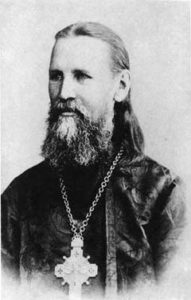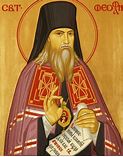SSCORRE!
Saint Sophia Cathedral
Online Resources for our Religious Edification
Topic of the Week – Imitate the Life of the Saint Whose Name You Bear
“At Holy Baptism each person is given a Christian name—the name of an angel or of some holy person. This bestowal of a Christian name at baptism as a profound meaning and a great significance. A Christian name serves not only to distinguish one person from another, but also establishes an important bond with the saint of that name and places a definite obligation upon him. From the moment a baptized person is given his Christian name, the saint whose name he has been given becomes his personal guide and mentor on the path to Heaven. The Christian is thus entrusted to this saint for instruction, for preparation for the life to come…. The bearing of a Christian name imposes a great and sacred obligation upon us: by our own life we must imitate the saint whose name it is our good fortune to bear; if not, we will show ourselves to be unworthy of the mercies of our heavenly protectors. We have been created for eternal life in heaven, and the saints are given to us as guides along the path….”
Adult/Family
Preschool/Elementary School
St. Hilarion, a brief account of whose life has been given above, serves as an edifying example of the imitation of the life of the saint whose name one bears. He often read the life of his patron saint and strove to follow his example in fasting and prayer.
We also should acquaint ourselves with the life of our patron saints and imitate them in our lives.
St. Athanasius the Great, Patriarch of Alexandria, relates that St. Anthony the Great, gathering the knowledge of the ascetics of his time, studied in each of them their outstanding traits: in one he observed hospitality, in another perseverance in prayer, in another the absence of anger, in yet another love for his fellow man; with some he was amazed at their patience, with others at their fasting. Thus did he combine into one what he had borrowed from others and strove to exemplify all the outstanding characteristics of them all. So also do we have an obligation to imitate the lives of the saints whose names we bear. To imitate them we must thoroughly know and study their lives. Indeed, it is sinful and unpardonable for one not to know the life of his patron saint. He who does not know the life of the saint whose name he bears and does not strive to imitate him in his own life, bears his name unworthily. He is unworthy of God’s mercy, for the saints are God’s friends, as the Psalmist bears witness, saying: “Wondrous is God in His saints; the God of Israel” (Ps. 67:35).
Excerpted from Orthodox Life, Volume 28, No 4, July-August 1978, pp47-49 OL 1978 (4).pdf | Powered by Box
______________________________________________________________________________________________________________________________________
A Message from Maria Spanos
I am passionate about our Orthodox Christian faith and seek to help others learn as much as they can about it. My purpose here is to share online resources that help strengthen our relationship with Christ and bind us closer to His Church. I believe they are invaluable in learning about our precious Orthodox Tradition, and are a great aid for teaching family members, friends and others about Orthodoxy. ~Maria
Two of my favorite quotes:
 “A true Christian behaves in this life so that it may be a preparation for the future one and not only a life here below. In his actions, he does not think what will be said of him here but of what will be said there in heaven; he represents to himself that he is always in the presence of God, of the angels and all the saints, and remembers that someday they will bear witness of his thoughts, words, and deeds.” — Saint John of Kronstadt
“A true Christian behaves in this life so that it may be a preparation for the future one and not only a life here below. In his actions, he does not think what will be said of him here but of what will be said there in heaven; he represents to himself that he is always in the presence of God, of the angels and all the saints, and remembers that someday they will bear witness of his thoughts, words, and deeds.” — Saint John of Kronstadt
__________________________________________________________

“Of all the holy works, the education of children is the most holy.”
— St. Theophan the Recluse







